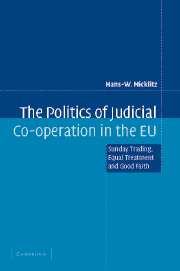Book contents
- Frontmatter
- Contents
- List of figures
- List of tables
- Preface and acknowledgments
- Table of cases
- Table of treaties
- Table of EC directives
- Table of statutes
- Table of statutory instruments
- List of abbreviations
- 1 Judicial activism and legal politics
- 2 The reconstruction of the Sunday trading cases
- 3 The reconstruction of the equal treatment litigation
- 4 The reconstruction of good faith in the control of unfair terms in consumer contracts
- 5 The limits of judicial activism and perspectives for legal politics
- Bibliography
- Index
4 - The reconstruction of good faith in the control of unfair terms in consumer contracts
Published online by Cambridge University Press: 06 August 2009
- Frontmatter
- Contents
- List of figures
- List of tables
- Preface and acknowledgments
- Table of cases
- Table of treaties
- Table of EC directives
- Table of statutes
- Table of statutory instruments
- List of abbreviations
- 1 Judicial activism and legal politics
- 2 The reconstruction of the Sunday trading cases
- 3 The reconstruction of the equal treatment litigation
- 4 The reconstruction of good faith in the control of unfair terms in consumer contracts
- 5 The limits of judicial activism and perspectives for legal politics
- Bibliography
- Index
Summary
Introduction: the reach and nature of the conflict between civil law, common law and European law
In 1993, the European Community adopted Directive 93/13/EEC on unfair terms in consumer contracts. The reactions in the legal community to the Directive were similar to the reaction to the Cassis de Dijon decision. After Cassis de Dijon, lawyers were obliged to accept that national laws and regulations would henceforth be measured against the basic freedom to trade. In 1993, fourteen years after Cassis de Dijon, the even more sensitive area of private law came under scrutiny from EC law. Private law is tied up with national traditions and cultures. Any attempt to subject private law to EC law would therefore be fraught with difficulties and would therefore meet opposition. The common law countries were particularly keen to oppose such a development, because the concept of good faith, as used in the Directive to exercise control over unfair terms in consumer contracts, was so alien to common law traditions. The understanding of good faith, and its role and function in common law and civil law, varies greatly among the legal communities of the Member States. Legal doctrine can, however, shed light on the extent to which a common law understanding of good faith fits into a ‘true’ European understanding of the concept.
- Type
- Chapter
- Information
- The Politics of Judicial Co-operation in the EUSunday Trading, Equal Treatment and Good Faith, pp. 292 - 423Publisher: Cambridge University PressPrint publication year: 2005



